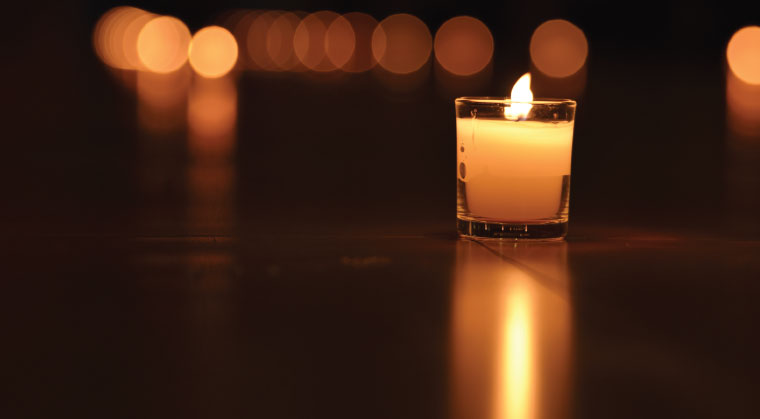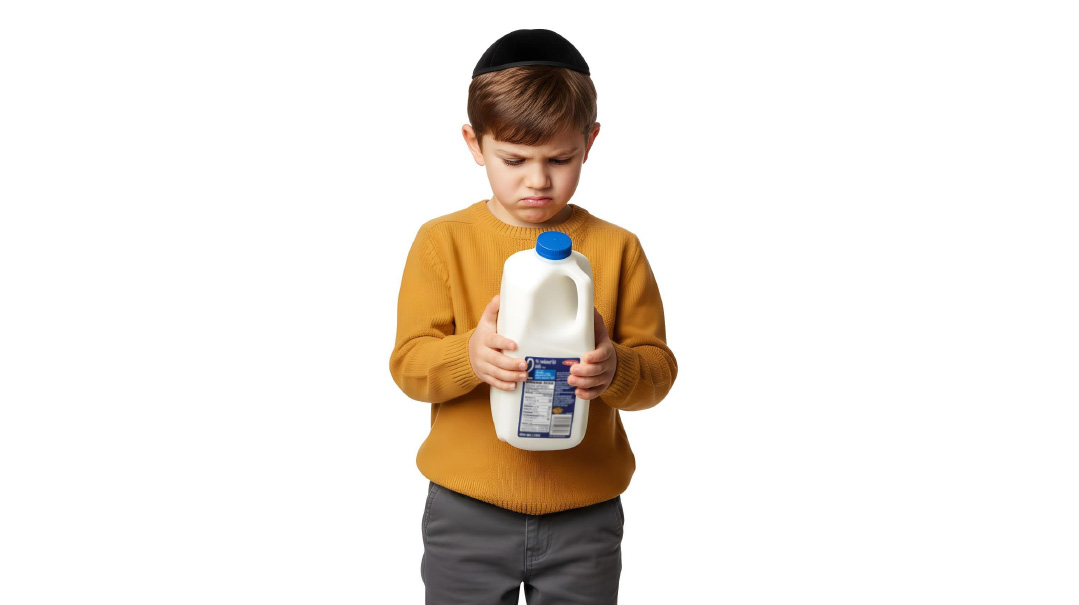Why, Hashem, Why?
| January 17, 2018We didn’t think to write it all down — what they’d been like before the war, the people and places they longed for, even decades later

I
don’t know who came to my grandparents’ wedding. I know that their parents, and most of their siblings, cousins, aunts, uncles, and friends were not there.
My grandfather, Meir, married my grandmother, Sprintza, in 1945. The wedding was held at Landsberg, a DP camp in the American-occupied zone of Germany, around 60 km west of Munich.
Before Hitler’s Final Solution, they lived in Zdunska Wola, a town of nearly 10,000 Jews, in the Lodz province of Poland. They were barely out of their teens when the Nazi boots stamped out their youth. Sprintza had been engaged to Meir’s older brother. He was killed.
My grandmother was one of 13 siblings; my grandfather, one of ten. When the ashes settled, my grandmother was left with one brother, Mottel, and one sister, Raizel. Mottel had been married with two young daughters before the war. He survived. They didn’t. My grandfather was the only one of his family left alive.
They met, two orphans tumbling through the devastation. Their answer to Hitler was to rebuild — right then, right there.
Bubby and Zeidy waited among thousands, fragments of families, for permission to emigrate to the United States. They were still in Landsberg, still looking toward the promise of the country that was to become home, when their first two children were born: their daughter, Sarah (my mother), and their only son.
“What was his name?” I asked my Aunt Miriam.
“I think his name was Daniel. I’m not sure. Bubby and Zeidy didn’t like to talk about him.”
There wasn’t enough food. There wasn’t enough medicine. When their son was a toddler he caught pneumonia. My grandparents couldn’t get the antibiotics that he needed. They couldn’t save his life.
The Nazis killed six million Jews, and the Nazis killed a small boy who may have been named Daniel.
Did my grandparents turn on Hashem? After so much loss, after a valiant new start, after another loss, did they want to know why?
If they asked the question, I never knew about it. If they were angry or bitter, I never saw it. My grandfather davened with his eyes closed. His body swayed with the words and the niggunim. He loved Hashem and he loved His People. He handed out treats, donations, and encouragement, and he smiled often. Even his eyes smiled.
Our family grew. My mother has 11 children. Her two sisters were born in America. One has 16 children, and the other, six.
“You have to eat,” my grandmother said every time I visited. I was a picky eater. Mostly I ate pickles and chocolate. I was named after her sister, Devorah, who died in the ghetto. My grandmother told me, more than once, that Devorah died of starvation and that the last thing she asked for was a plum.
My grandmother made meatballs that were bigger than baseballs and cookies that had to be sliced. She stocked the shelves of the “cold room” in her finished basement in Boro Park with rows of jars — homemade applesauce, borsht, sweet whitefish in even sweeter sauce. We knew from when we were very young that we could not waste food. We became creative: If we didn’t want to finish what we were served, we would wrap it or ball it up and sneak it out of the house. Otherwise it would be served to us again and again and again. In my grandparents’ house, food was never thrown away.
We saw the numbers tattooed on their arms, heard slips and slivers, residue of their time “in the camps,” along with happier memories of “before.” We, the American grandchildren, didn’t know enough to pay close attention, to collect each gem. We didn’t think to write it all down — what they’d been like before the war, the people and places they longed for, even decades later.
My grandparents paid attention. We were a rowdy mob of cousins and they kept track of who liked which treat, who needed extra love. We argued about who was their favorite. Each of us claimed special treatment from Bubby and Zeidy, but I knew the truth: There was only one favorite grandchild — and it was me. I remember my grandfather’s eyes shining when I put my firstborn, Yossi, into his arms, officially crowning him “great-grandfather.”
My husband and I used to think that “everyone has something.” We had something: Four of our babies died. Four out of eight, half of our children, died as infants from a rare hereditary mitochondrial disorder. We knew our trial — the four who died. And we knew our blessing — the four who lived.
We pushed through the years of illness and death, pushed through the sadness — to raise our son and three daughters in a home that let in hope and joy. We found a way. We had to. Our babies died. But we went on. Because, “everyone has something.”
But then… then… our only son, our Yossi, died. He was 23. He died six weeks before his wedding.
To lose. To rebuild. To lose again.
I wish I’d asked my grandparents the critical questions: How did you do it? From where did you draw the strength to give to others? To smile? How did you not scream after the camps, and again after the death of your only son — Why, Hashem? Why?
It’s not a new question. Moshe asked it. Hashem sent him to ask Pharaoh to free His nation. Pharaoh refused. After Moshe intervened, Pharaoh decreed that the slaves would be forced to gather their own supplies and still produce the original quota of bricks. Moshe cried out to Hashem: “Why have You done harm to Your people?” Moshe had tried to help; he had done as he was told. Not only had the situation not improved, it became worse!
It’s been seven years since Yossi died. My husband and I still ask, “Did that really happen? Did Yossi really die?” For months and months, even more forceful than our sorrow was our disbelief. We literally couldn’t believe it. After all we went through? Again? Why? Hashem, why?
Hashem answered Moshe’s question. Hashem said, “I am Hashem….”
The Lubavitcher Rebbe explains this: Nothing else exists. Nothing else is real. The answer, “I am Hashem,” speaks of that which is beyond us, beyond this world.
Moshe, the man of intellect, wanted to know why, but wisdom can only take us so far. Even the smartest person in the world can’t grasp the infinite with a finite human mind. “I am Hashem” moves us past the limits of what we can understand, calls us to take a leap; to believe, and to do.
“I am Hashem” introduced Moshe to the greater plan: The world would change. We would be redeemed from Egypt. Soon. Soon. It would be wondrous. We would gather at Har Sinai, hear the voice of Hashem, and receive the Torah — the unlimited wisdom of the Creator. We would reach past our own boundaries, to make room for that which is G-dly. Then, only then, could we truly absorb Hashem’s Torah.
Hashem says, “I am Hashem,” and we know it as truth because of the part of Hashem that’s in us, the neshamah, the forever, that exists within our here and now, that recognizes that there’s more than what we can see, and more than what we can understand.
“I am Hashem.” Know this, and there are no questions.
“I am Hashem.” Know this, and become part of the answer.
It’s the same Hashem. In the agony of slavery. In the glory of Matan Torah. “I am Hashem.”
We are conditioned to respond to “How are you?” with the words “Baruch Hashem.” We say baruch Hashem about the Hashem of the “good stuff.” We say baruch Hashem, as well, about the Hashem of the “tough stuff.”
At Yossi’s levayah, as we ripped our clothing, as we made the loss tangible, we said the brachah that Yidden have said over their dead for generations, “Boruch Dayan HaEmes — Blessed is the True Judge.” We can’t know why. We can know, for sure, that even as we are hurting, there is a True Judge.
My grandparents, Meir and Sprintza, would have loved my children’s children. Our oldest grandson is Yosef Meir; his eyes get big when he describes something exciting. Yosef Meir — named for Yossi and for my grandfather — was born the week before the Kaddish ended for Yossi. One life moved further away from us as another rushed toward us. We have a granddaughter, Shaina Sprintza, who giggles when she says her name. With sadness on one side and joy on the other, we are, again, moving forward. We can’t know the “why” right now, but we do know the “what” that is asked of us: To do. To continue. To trust.
Because “I am Hashem.”
(Originally featured in Family First, Issue 576)
Oops! We could not locate your form.












